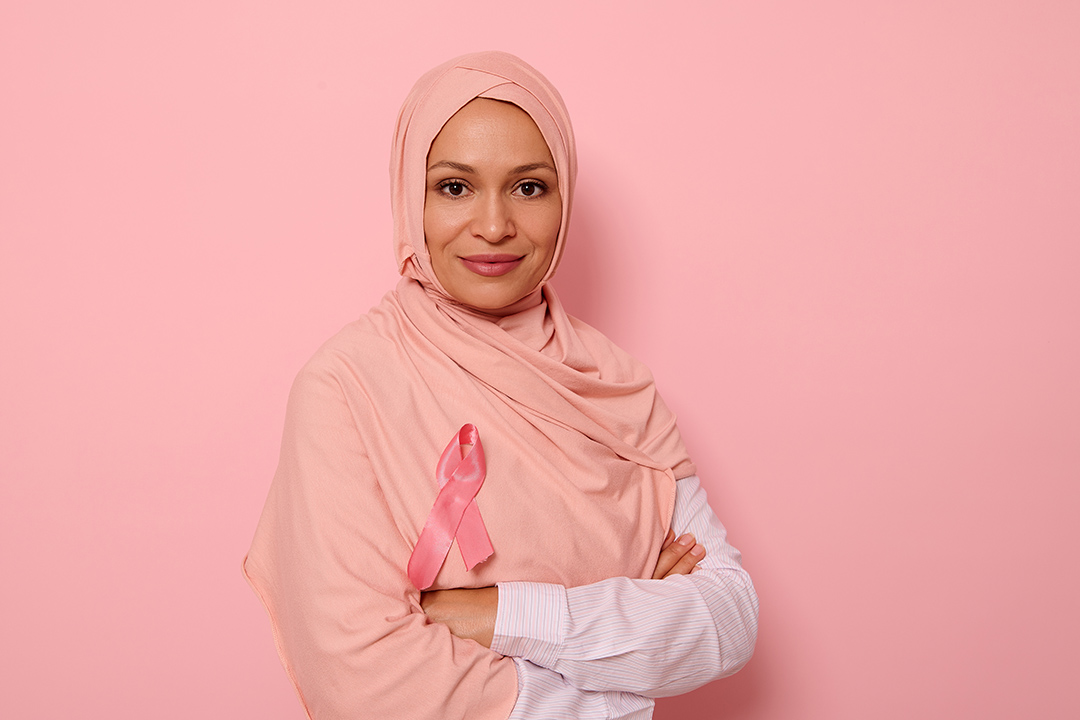
USask researchers explore breast cancer screening access for refugee women in Sask
A research team is exploring how to increase access to breast cancer screening for Syrian refugee women in Saskatchewan.
By Kylie KelsoPink ribbons cling to storefront windows, social media is filled with pink reminders, and friends and family join together in pink attire for awareness walks in their communities. It’s Breast Cancer Awareness Month.
Canadians know what pink means, in particular the pink ribbon. We understand why we see a flood of pink and ribbons on display in October. But what if you’re a refugee new to Canada – how much do you know about breast cancer?
Drs. Louise Racine (PhD), Sithokozile Maposa (PhD), and Susan Fowler-Kerry (PhD) from the University of Saskatchewan (USask) College of Nursing, Dr. Hassan Vatanparast (PhD) from USask’s School of Public Health, and Dr. Isil Andsoy (PhD) of the Department of Nursing at Karabuk University, Turkey, have been exploring breast cancer awareness and preventative screening knowledge among Muslim Syrian newcomers to Saskatchewan.
“My research focuses on non-Western immigrant and refugee health and I have practice experience in cancer care,” said Dr. Racine. “Saskatchewan has recently welcomed a number of Syrian refugees, but because they have not lived in the province long, health-care providers are not familiar with their health knowledge, including their level of education regarding breast cancer.”
Globally, breast cancer takes the most lives of all cancers. Early detection through preventative screening plays an important role in the outcome of someone diagnosed with breast cancer; however, information regarding how to access and complete the screening is not always available or readily received.
Racine said non-Western refugee women are particularly vulnerable to late-stage breast cancer diagnoses because they don’t know what preventative screening is or how to access it through the Western health care system.
“Although accessibility to breast screening greatly varies among Middle East and Gulf countries, immigrant and refugee women from some Arabic-speaking countries appear to have the lowest breast cancer screening rates among ethnocultural groups living in Western countries,” said Racine. “Without proper screening, Muslim Arab refugee women could be diagnosed later and the later diagnosis likely affects health outcomes and survival rate.
“The goal of our project is to help nurses design culturally appropriate health promotion tools to increase knowledge about breast cancer and how to perform breast self-examinations and undergo mammograms in preventative efforts.”
“Nurses need to understand the cultural beliefs of the Muslim culture and the Islamic faith on women’s knowledge, beliefs, behaviours and willingness to perform breast cancer screening before we can create the educational pieces regarding the screening,” Racine added. “Our research will inform us about potential ways to educate Syrian refugee women on breast cancer and prevention.”
Racine’s interdisciplinary research team combines expertise in nursing, refugee health, women’s health, global health, and palliative care. Once their study in Saskatchewan is complete, they hope to receive funding to conduct the study on a larger scale in Canada and Turkey. The current study has received funding from Sigma Theta Tau International and the Canadian Nurses Foundation.
The complete study, Examination of Breast Cancer Screening Knowledge, Attitudes, and Beliefs among Syrian Refugee Women in a Western Canadian Province, can be viewed here.

